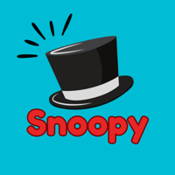
Overview
Synopsis
Snoopy is the sequel to You're a Good Man Charlie Brown and focuses on the life of the world's most famous beagle. Atop his kennel, Snoopy surveys the skies, scene of his triumph as a First World War flying ace. Modestly, he considers himself a genius. Stoically, he accepts that his brilliance in nearly every field of endeavor will forever go unremarked by humankind. The show contains over 15 toe-tapping tunes performed by Charlie Brown, Lucy, Sally, Linus, Peppermint Patty, Woodstock, and one loveable beagle.
Show Information
Context
Plot
Characters
| Name | Part Size | Gender | Vocal Part |
|---|---|---|---|
|
Lead |
Male |
Tenor |
|
|
Lead |
Male |
Tenor |
|
|
Supporting |
Male |
Silent |
|
|
Supporting |
Female |
Alto, Mezzo-Soprano |
|
|
Supporting |
Male |
Tenor, Baritone |
|
|
Supporting |
Female |
Mezzo-Soprano |
|
|
Supporting |
Female |
Alto |
Songs
Act One
- Overture - Orchestra †
- The World According To Snoopy - Ensemble
- Snoopy's Song - Snoopy & Ensemble
- Woodstock's Theme - Orchestra
- Hurry Up Face - Peppermint Patty †
- Edgar Allan Poe - Peppermint Patty, Lucy, Sally, Linus, Charlie Brown
- Prom - Orchestra
- Mother's Day - Snoopy †
- I Know Now - Sally, Peppermint Patty, Lucy
- The Vigil - Linus
- Clouds - Ensemble
- Easter Beagle -Orchestra
- Where Did That Little Dog Go? - Charlie Brown
- Dime A Dozen - Lucy, Snoopy, Peppermint Patty, Sally †
- Daisy Hill - Snoopy
- When Do The Good Things Start? - Ensemble †
Act Two
- Entr'Acte - Orchestra
- Bunnies - Snoopy †
- The Great Writer - Snoopy
- Poor Sweet Baby - Peppermint Patty
- To the Movies - Orchestra
- Don't Be Anything Less Than Everything You Can Be - Sally, Linus, Peppermint Patty, Charlie Brown
- Playoff: Anything Less - Charlie Brown, Linus, Sally, & Patty
- The Big Bow-Wow - Snoopy
- Woodstock’s Last Stand - Orchestra †
- Just One Person - Ensemble
- Bows/Don't Be Anything Less Than Everything You Can Be (Reprise) - Ensemble
† Added for the West End production and later
A song with an asterisk (*) before the title indicates a dance number; a character listed in a song with an asterisk (*) by the character's name indicates that the character exclusively serves as a dancer in this song, which is sung by other characters.
Monologues
Scenes
Key Terms
In theatre, refers to the collective of artists, audience, and supporters, or to a type of amateur or local theatre.
To imagine unreal scenarios, often portrayed on stage through dreams, desires, or escapism.
A self-centered character trait often dramatized to explore vanity, manipulation, and personal downfall.
A system of thought exploring existence, ethics, or knowledge, often influencing theatrical movements like existentialism or realism.
A follow-up work that continues the narrative or themes of an earlier play or musical.
A vignette in drama is a short, self-contained scene or playlet that focuses on a single moment, theme, or character interaction. It does not require a full plot or complex structure, but instead provides a snapshot of life that conveys emotion, humor, or insight. Vignettes can stand alone or be grouped together to form a larger work.
Videos
Quizzes
Themes, Symbols & Motifs
Sorry! We do not currently have learning modules for this guide.
Quote Analysis
Sorry! We do not currently have learning modules for this guide.
